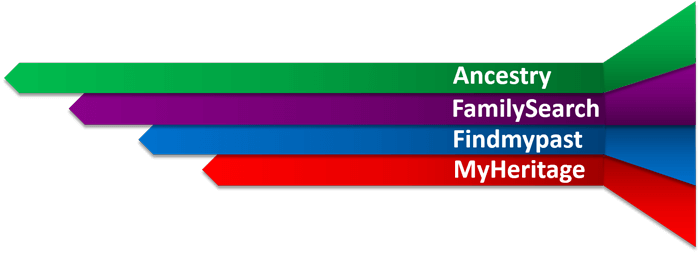Blog

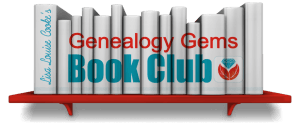
Genealogy Book Club Gems: Add These to Your Must-Read List
These three must-read titles from our Genealogy Book Club would be great stocking stuffers for yourself or someone you love. See my newest book recommendations for family history lovers by best-selling authors Christina Baker Kline (Orphan Train) and A.J. Jacobs (The Year of Living Biblically)–and another author I recently discovered and couldn’t stop reading.
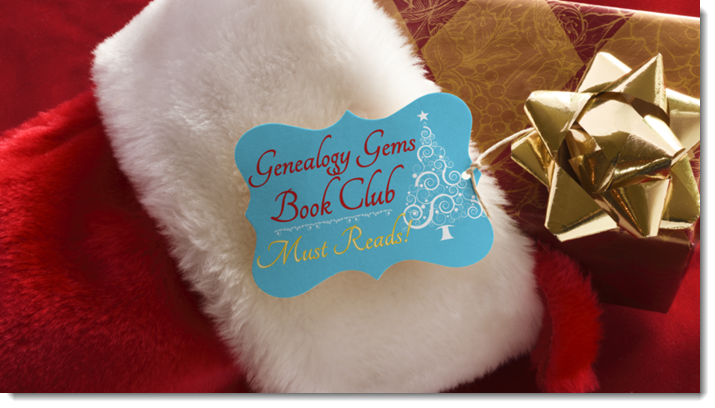
3 Must-Read Books for Family History Lovers
1. A Piece of the World by Christina Baker Kline
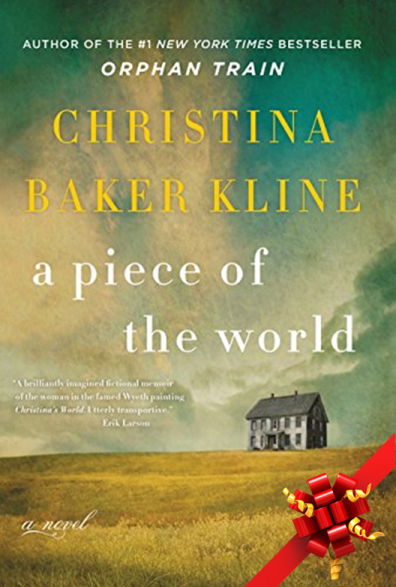 “You can never escape the bonds of family history, no matter how far you travel. And the skeleton of a house can carry in its bones the marrow of all that came before.” So says the Prologue to a new novel by best-selling novelist Christina Baker Kline, whose novel Orphan Train has been loved by millions around the world (and a lot of Genealogy Gems Book Club fans–we featured it in 2014).
“You can never escape the bonds of family history, no matter how far you travel. And the skeleton of a house can carry in its bones the marrow of all that came before.” So says the Prologue to a new novel by best-selling novelist Christina Baker Kline, whose novel Orphan Train has been loved by millions around the world (and a lot of Genealogy Gems Book Club fans–we featured it in 2014).
A Piece of the World is a unique and irresistible story about a woman whose physical disabilities and family’s demands keep her adventure-loving spirit firmly homebound. Granted, her home is a fascinating place: a 1700s-era home on the coast of Maine that has been passed down for several generations. But the noble legacy of the home instills a sense of obligation in those who live there now: do they stay on the family land at all costs, even the cost of their happiness and health? What happens when a family’s heritage becomes a burden, not a blessing?
Those who love American art will love that the main character, Christina, was inspired by the subject of the Andrew Wyeth painting, Christina’s World. (You can see an image of the painting here.) Christina was a real person who lived in this home. Andrew visited her and her brother and painted them many times. So the characters and setting are real, and the house is actually a National Historic Landmark now. Christina Baker Kline’s “fictional memoir” gives this historical Christina a powerful, honest, and insightful voice: the voice of a person who sees and tells it like it is–except the parts she just can’t see for herself.
2. It’s All Relative: Adventures Up and Down the World’s Family Tree by A.J. Jacobs
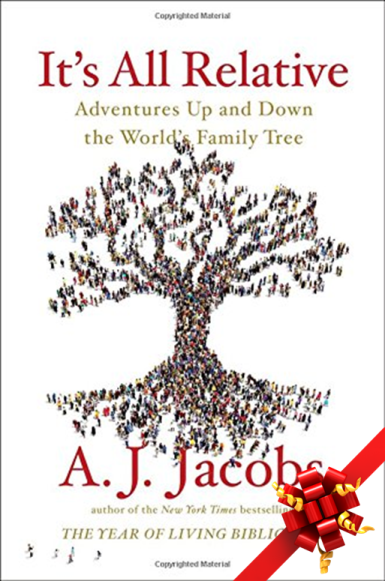 You could say A.J. Jacobs is famous for asking questions that seem both important and inane, and then pursuing the answers and writing about it. That’s what he did with his best-selling book The Year of Living Biblically, a chronicle of the time he tried to obey every rule in the Bible. Now he’s done it again in his new book, It’s All Relative: Adventures Up and Down the World’s Family Tree.
You could say A.J. Jacobs is famous for asking questions that seem both important and inane, and then pursuing the answers and writing about it. That’s what he did with his best-selling book The Year of Living Biblically, a chronicle of the time he tried to obey every rule in the Bible. Now he’s done it again in his new book, It’s All Relative: Adventures Up and Down the World’s Family Tree.
The questions A.J. set out to answer here were, “Who is really my family? And what would happen if I tried to host the world’s biggest family reunion?” He’s been working on this topic for a while. Remember the Global Family Reunion in 2015? That was his brainchild. He also spoke at RootsTech in 2016.
A.J.’s voice is witty with lots of digressions, pop culture references, and a definite urban beat (NYC, specifically). He meditates on what genealogical connections mean to him and the larger story the world’s family tree tells us. Like, we’re all related, and therefore shouldn’t we get along better? But with the quick disclaimer that he’s not inviting us all over for New Year’s brunch. He did that already at the Global Family Reunion–which he reports on in detail. (Did it succeed? Did it fail? I’ve been wondering myself since 2015). In the appendix, he recommends all kinds of genealogy how-to resources, including Genealogy Gems.
If you yourself are somewhat relaxed and perhaps even a little irreverent about your genealogy hobby, you’ll likely really enjoy this book. What about the more earnest family historians? It’s still worth a glimpse into how others see us. A.J. comes peeking into the world of genealogy ready to crack jokes. And he does plenty of that. But he also comes away with a great deal of respect for the stories and relationships that can–and should, he says–bring us closer together.
3. Shannon by Frank Delaney
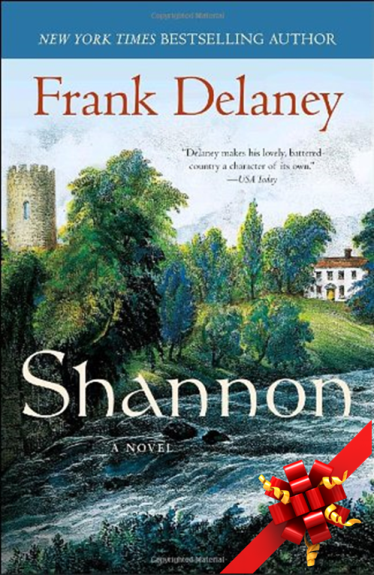 This isn’t a new book this year–it’s a classic I only recently discovered and can’t recommend more enthusiastically! I listened to the audiobook version, which the author narrates himself with great skill. Now I’m going to buy the print version so I can re-read, underline, and dog-ear all the passages that made me swoon. Oh. My. Goodness. Frank Delaney is a MASTER storyteller. He crafts every sentence, every image. You can practically see the story lines unfold, hear every action, smell it. I gasped, I cried, I laughed–all out loud in the car as I listened.
This isn’t a new book this year–it’s a classic I only recently discovered and can’t recommend more enthusiastically! I listened to the audiobook version, which the author narrates himself with great skill. Now I’m going to buy the print version so I can re-read, underline, and dog-ear all the passages that made me swoon. Oh. My. Goodness. Frank Delaney is a MASTER storyteller. He crafts every sentence, every image. You can practically see the story lines unfold, hear every action, smell it. I gasped, I cried, I laughed–all out loud in the car as I listened.
Shannon is a stunning tale: Father Shannon, an American Catholic priest of Irish descent, has serious “shell-shock” trauma after serving in the trenches of World War I. His archbishop sends him on a respite trip to Ireland to travel up the Shannon River looking for his family roots. He lands in the middle of an Irish Civil War—but also encounters person after person who helps him rediscover his faith in humanity and the restorative balm of daily life. Meanwhile, intrigue is afoot within his home archdiocese. A killer, who has his own traumatic backstory in Ireland, is dispatched to make sure Father Shannon never returns home. Their stories converge in a place of love, but also far too close to a place of pain. And that’s all I’m going to tell you about it. Read it or listen–and then clear a spot on your reading list for his epic novel, Ireland, which I read immediately after this one and also loved.
Genealogy Book Club: It’s All about YOU
 The Genealogy Gems Book Club is a service we provide the genealogy community because we love giving you more to talk and think about! We handpick our favorite mainstream fiction and nonfiction books that have great genealogy themes, such as someone searching out their family history, the complexities of family relationships, and the fascinating times and places our ancestors experienced.
The Genealogy Gems Book Club is a service we provide the genealogy community because we love giving you more to talk and think about! We handpick our favorite mainstream fiction and nonfiction books that have great genealogy themes, such as someone searching out their family history, the complexities of family relationships, and the fascinating times and places our ancestors experienced.
As a special bonus, we sometimes invite authors of our Book Club titles to join us on the Genealogy Gems Premium Podcast, available by subscription. It’s so fun to hear my favorite authors gush about the same kinds of topics I love! Hear from beloved and best-selling writers like Fannie Flagg, Annie Barrows, Helen Simonson, Lalita Tademy, and a favorite of genealogists around the world, Nathan Dylan Goodwin. Click here to see our full book list and where you can hear these interviews.

Why You Should Have a Free FamilySearch Account–And Use It!
A free FamilySearch account gives you access to more historical records and customized site features than you’ll see if you don’t log in at this free genealogy website. Here’s why you should get a free FamilySearch account and log in EVERY time you visit the site.

This post is part of our ongoing commitment to help you get the most out of the “Genealogy Giants:”
In this post, I comment on a recent announcement from the free giant everyone should be using: FamilySearch.org.
Why you should have (and use!) a free FamilySearch account
FamilySearch.org has always allowed free public use of its site. But beginning on December 13, 2017, the site will now actively prompt visitors to register for a free FamilySearch account or to log in with their existing accounts. Anyone can continue to search the catalog and user-submitted genealogies, explore over 350,000 digitized books, learn from the Wiki and the learning center, and even view user-contributed photos and stories. But by requesting you to log in, FamilySearch wants to remind you that this is your path to even more free records and services on the site.
Here are my top three reasons to have and use a free FamilySearch account:
1. Access more free historical records on FamilySearch.
We’ve talked a lot in recent months about best strategies for accessing digitized and off-line historical records at FamilySearch. Some of the digitized records on FamilySearch are there courtesy of a partner organization, which may restrict record access to those who log in on the site.
One woman had an “ah-ha” moment of realization after reading FamilySearch’s announcement. She posted in the comments, “Though I have had a free account for some time, I did not realize that FamilySearch was not giving me full access to information in record searches just because I had not logged in. Maybe I need to redo my past searches as a logged-in account holder.”
2. Participate in the global Family Tree.
As I more fully describe in my quick reference guide, Genealogy Giants: Comparing the 4 Major Websites, FamilySearch’s online family tree is different than the tree systems used at the other major family history websites. Instead of creating your own personal tree, you participate in a collaborative, unified family tree of the world. As a logged-in visitor, you can enter your information, then that of your parents and their parents, etc. until you connect to deceased individuals who are already on the tree. (Information about living individuals is always privacy-protected.) Then you may, with other descendants, contribute what you to know to an ancestor’s profile.
Anyone may make changes to these public profiles, which may at times be frustrating. But it also allows for more focused collaboration. This is a great place to see a virtual compilation of others’ research on particular ancestors without having to search others’ personal trees individually, as you do on other sites (remember to look for their source citations and verify what others say). The Family Tree on FamilySearch is also a great place to digitally archive family documents and photos where other researchers may see and appreciate them for free. As you can see in the screenshot below, logging in also helps you see how others have identified the folks you see in your search results:
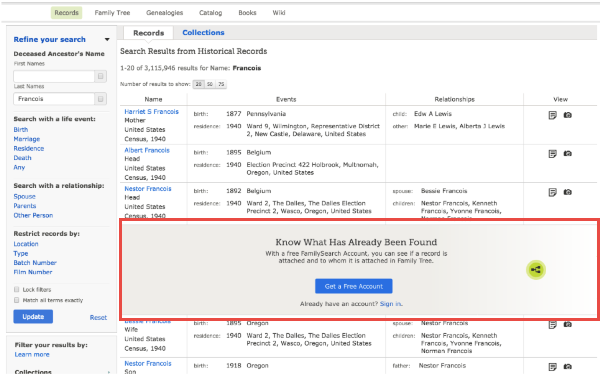
3. Get customized help.
Those who log in with a free FamilySearch account have access to one-on-one assistance through the website. If you have a question about using the site, accessing records, finding additional records about your ancestors, or even how to understand the records you’re looking at, you can email or call a live support person for help. Your login also sets you up to receive customized alerts and seasonal messages (like “Did you know your ancestor fought in the War of 1812?”) and a dashboard experience with at-a-glance reminders of record hints awaiting your review, where you left off in your last online session, tips about what to do next, and more. Here’s what the dashboard looks like:
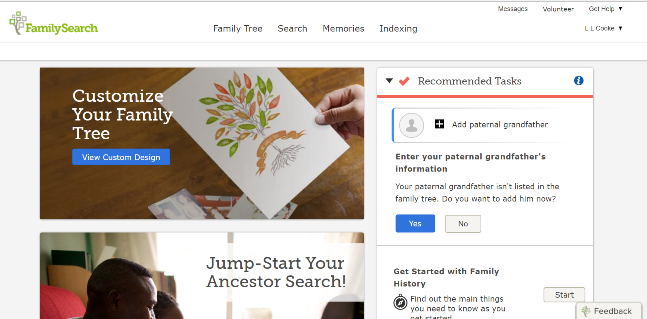
How to get (or recover) a free FamilySearch account
See Registering to use FamilySearch.org for information about creating a free account. FamilySearch accounts have always been free and, the site assures us, will continue to be free. You will need to provide your first and last name, a username, a password, and an email or mobile phone number.
According to FamilySearch, your login and other personal information:
- enables collaboration in the Family Tree and Memories areas of the site (you control how much information is shared)
- “allows you to send in-system messages to other users without revealing your personal identity or email address”
- “allows FamilySearch to send you emails and newsletters (you can specify how many emails, if any, you receive)”
- enables communication when you contact their online support team for help
- will not be shared “with any third party without your consent”
If you’ve already got a FamilySearch account but have forgotten your username, click here. If you’ve forgotten your password, click here.
Genealogy Gems Brings You Genealogy Giants
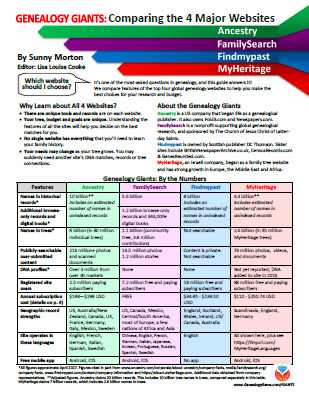 Each of the “Genealogy Giants” has so much to offer family historians around the world! But it’s hard to keep them straight, compare their top features, and get the most out of them without some inside help. That’s why we published the must-have quick reference guide, Genealogy Giants: Comparing the 4 Major Websites, your personal comparative tour of Ancestry.com, FamilySearch, Findmypast, and MyHeritage.
Each of the “Genealogy Giants” has so much to offer family historians around the world! But it’s hard to keep them straight, compare their top features, and get the most out of them without some inside help. That’s why we published the must-have quick reference guide, Genealogy Giants: Comparing the 4 Major Websites, your personal comparative tour of Ancestry.com, FamilySearch, Findmypast, and MyHeritage.
This inexpensive guide can save you hours of wasted time hunting down the records you need. It can save you hundreds of dollars by helping you invest in the genealogy websites you most need to use right now–because your research needs change right along with your growing family tree! The guide is available for your immediate reference as a digital download or get a handy, high-quality printed copy you can keep with your genealogy research files.
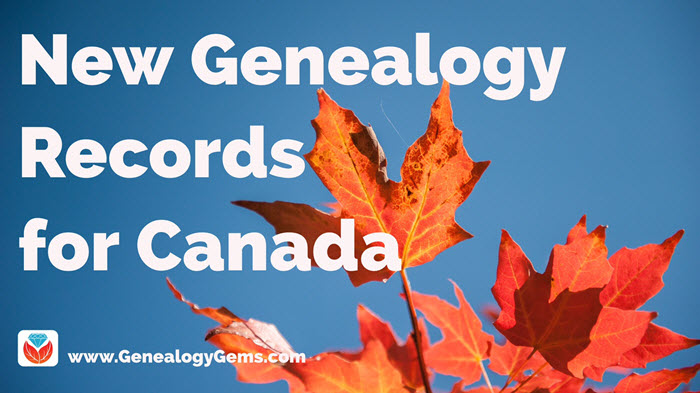
New Genealogy Records for Canada and the United States
New and updated records for Canada and the United States are hot off the press this week. Mortality schedules, cemetery records, Roman Catholic records, and passenger lists are listed for Canadian genealogy research. For the United States, check out Ohio newspapers, New Jersey census records, Confederate maps, and more.

Canada – New and Updated Collections
Ancestry has three brand new collections of Canadian records. First is the Census Mortality Schedule, 1871, covering the provinces of New Brunswick, Nova Scotia, Ontario, and Quebec.
Specifically for Ontario, Toronto Trust Cemeteries, 1826-1989 includes records of several Toronto Cemeteries. And the Roman Catholic Baptisms, Marriages, and Burials, 1760-1923 collection includes indexed records of Ontario baptisms, marriages, and burials. Other records, such as family lists, communions, and confirmations may appear, but do not have associated indices.
At FamilySearch, the collection of Canada Passenger Lists (1881-1922) has been updated with over 33,000 new indexed records. The collection contains an index and images of ships’ passenger lists (also known as ships’ manifests or seaport records of entry).
United States – Newspapers, Census Records, & More
Ohio. MyHeritage has a new collection of Ohio Newspapers from 1793-2009 that you’ll definitely want to explore. These newspapers come from various cities and towns throughout the state and may provide vital records substitutes as well as a glimpse of daily life.
New Jersey. State Census records for New Jersey are now online at Ancestry for the following years: 1855, 1865, 1875, 1885, 1905, and 1915. Records did not survive from all New Jersey counties but all available records are included in this collection.
New York. Brooklyn, Bethlehem Steel Shipyard Employment Cards, 1908-1965 is another new collection at Ancestry. Records include name, age, birth date, next-of-kin, and employment date.
Illinois. New over at FamilySearch are Illinois Mortality Schedules, 1850-1880. This collection lists people who died in the year preceding each census starting in 1850.
National Archives. Over 100 Confederate maps have been digitized at the National Archives. These maps are part of Record Group (RG) 109 and can be viewed online as well as downloaded. Additionally, some of the maps contained unique information on the back, and both sides are available to view in the Catalog.
Railroads. Finally, the Railroad Retirement Pension Index, 1934-1987 is available now at Ancestry. Records vary, but the information found may include birth date, death date, and social security number.
 Join the Genealogy Gems newsletter!
Join the Genealogy Gems newsletter!
Our weekly e-newsletter is packed with the latest in all things family history! Included each week is our round-up of new and updated records collections around the web and offline. Get inspiring ideas, brick wall strategies, expert interviews, and more when you sign up for our free newsletter. As a bonus, you’ll get a free ebook of my top Google search strategies! Click here to sign up now.

